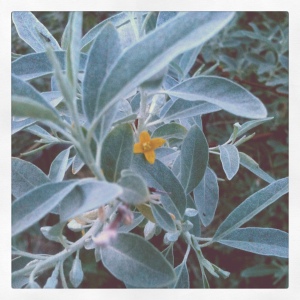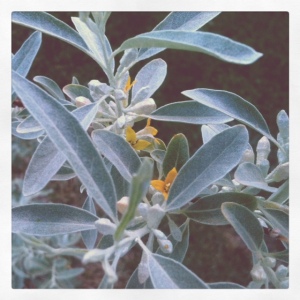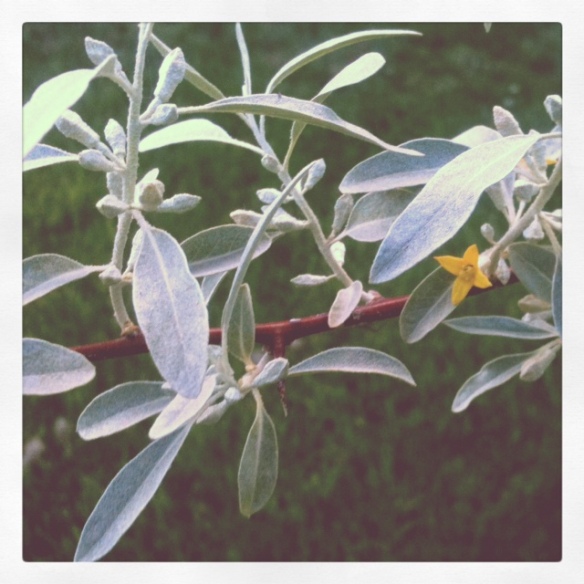I sense it the moment they open. The air is instantly different. Heavier with fragrance, yet lighter and warmer with summer’s sweetest scent. It is as if the world has stopped. And I am encapsulated within a gossamer cocoon, spun of the perfume of tiny yellow blooms peeking out shyly from among the silvery green leaves of its tree.
 You cannot even see them, until looking close. Close enough to notice their bright yellow eyes, their sweet scent almost visibly aloft in pale waves upon the summer’s evening air, proclaiming dreamily that summer is here.
You cannot even see them, until looking close. Close enough to notice their bright yellow eyes, their sweet scent almost visibly aloft in pale waves upon the summer’s evening air, proclaiming dreamily that summer is here.
.
I’d love to bottle their sensory beauty, corking it carefully airtight, and displaying it reverently upon a shelf. But it wouldn’t be enough to just look at it. I wouldn’t be able to resist its summery magnetism, opening it slowly with its soft scent taking me back to June, no matter the month.
 One summer evening years ago, as they were just beginning to unfurl their fragrant blooms, I thought there could be nothing more perfect than cutting a few branches to put in a vase in my house. I imagined their perfume lightly scenting my entire house, waking me in the mornings with their sheer, veiled aura. But after only a few hours, their scent had fermented into something hotly putrid and overpowering. I’m not sure if it was their anger at being cut from their mother trees or the extremely close proximity, but I quickly realized that some things are better left unrestrained, wild and floating freely on the hint of a summer breeze. That they just cannot be bridled and harnessed into a vase indoors. They must be aloft upon the breeze, their yellow scented pollen riding happily to destinations unknown. Their strong scent diluted with the warmth of the air, moving and swirling their fragrance here, there and everywhere.
One summer evening years ago, as they were just beginning to unfurl their fragrant blooms, I thought there could be nothing more perfect than cutting a few branches to put in a vase in my house. I imagined their perfume lightly scenting my entire house, waking me in the mornings with their sheer, veiled aura. But after only a few hours, their scent had fermented into something hotly putrid and overpowering. I’m not sure if it was their anger at being cut from their mother trees or the extremely close proximity, but I quickly realized that some things are better left unrestrained, wild and floating freely on the hint of a summer breeze. That they just cannot be bridled and harnessed into a vase indoors. They must be aloft upon the breeze, their yellow scented pollen riding happily to destinations unknown. Their strong scent diluted with the warmth of the air, moving and swirling their fragrance here, there and everywhere.
Of all the many scents in the world, I know it is my favorite. It is memories of small towns in summer, of tall grass growing green in the hay fields, swaying with the breeze like a loosely-threaded tide. It is memories of summer concerts, the music rising and mingling with their perfume upon the still summer air. Of barbecued ribs, and warm evenings not yet disturbed by the hum of mosquitos, serenaded with its sweet scent upon the dusk. It is the feeling of night’s coolness slowly filtering across our little valley from the wet rushing of the river, dampening the grass and the day’s memories with dew. And in the morning, its perfume rises again, lifted from its tiny yellow petals to be wafted upon the light air for another day.
 How I wish it lasted all summer, this perfect essence of fragrance. Ushering us into and out of summertime, like a graceful doorman, visible with the first opening of the glass door to summertime, but almost unnoticeable the remainder of the summer with his well-trained etiquette and quiet existence. Eventually they would escort us out of summer without even a goodbye, only the faint fading of their scented beauty growing slighter and slighter, until we no longer even miss their presence.
How I wish it lasted all summer, this perfect essence of fragrance. Ushering us into and out of summertime, like a graceful doorman, visible with the first opening of the glass door to summertime, but almost unnoticeable the remainder of the summer with his well-trained etiquette and quiet existence. Eventually they would escort us out of summer without even a goodbye, only the faint fading of their scented beauty growing slighter and slighter, until we no longer even miss their presence.
Alas, we are blessed with but a week of heaven in June. Maybe that makes its arrival all the sweeter, and its exit all the more lonely in its abrupt end. Its short-lived aromatic culmination something relegated to just memory again for another year
So as the lovely season of the fragrant Russian Olives draws to an end, may you find the time to be still, soaking up the most of what comes around just once a season. May you enjoy the sweet scent of summertime upon the warm breeze and may you relish the many blessings summer brings.
*As a footnote, I feel I must tell you that the Russian Olive tree is an outlaw. It is a foreign species that gained notoriety for its overtaking of western river banks since it was introduced to the US in the late 1800’s. But in its defense, it is without a doubt, a scrappy survivor. With shoots of sharply-thorned branches hurtling forth from its trunk almost daily, it doesn’t mourn for the weak. Their roots ground them in odd places, unfit for other trees. They thrive in sand and poor soil, reaching deeper and deeper for water and nutrients. And according to multiple sources, their roots can produce their own nitrogen, allowing them to grow even in nutrient-deprived soil. They have a bad habit of out competing our native trees and shrubs in wild areas and they enlist the help of our feathered friends, who gorge upon the tree’s ripened berries, to disperse their seeds. The Russian Olive is currently classified as an invasive species in Colorado and 29 other states. For this reason,Colorado banned the sale of Russian Olive trees within the state to its residents in 2002.

